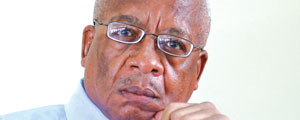
After being virtually robbed of victory in 2008 — where the winner became the loser and the loser became the winner — it was never going to be easy for the main opposition MDC-T come 2013. In fact, it was going to be harder next time around because the system had been rudely awakened to the reality of loss. So, they had to avoid that grim prospect at any and all costs.
This resulted in last year’s devastating — but very controversial — defeat of the opposition, which plunged them into the depths of despair.
Yes, the blundering of the opposition cannot be overlooked. Instead of cutting deals, they were cutting each other’s throats over a prize which was not yet within their grasp.
They fought for a slice of an ever-diminishing cake, squeezing themselves out of political space already much unfairly shrunk by the anti-reformist Zanu PF — as seen in their contemptuous disregard of the Global Political Agreement (GPA) — with the latter enjoying this at the ringside. Such folly and futility is what prompted the observation by former United States judge Walter P Stacy (1884-1951) that “men have gone to war and cut each other’s throats because they couldn’t agree as to what was to become of them after their throats were cut”.
Indeed, the opposition has lacked tact and vigilance. After united MDC leaders Morgan Tsvangirai, Welshman Ncube and the late Renson Gasela were almost tricked into uttering treasonous statements by Zanu PF-paid Israeli spy Ari Ben-Menashe (described by Justice Paddington Garwe as “rude, unreliable and contemptuous”) in 2002, they should have shown greater political nous to work together despite their different tendencies, but they allowed the system to further infiltrate, divide and weaken them. With the ruling class torn between patronage and populism — as seen in endemic corruption and disastrous economic policies — which made people extremely angry and poor — the opposition could have made headway if they had remained united. Some of these characters should never have been in politics in the first place. They should have left politics to real politicians.
That said, the MDC-T struggled to utilise their popularity to pressurise an entrenched ruling party to reform. The GPA — signed in 2008 at the height of the self-induced economic meltdown — was like a deal with the Devil, but was the lesser of two evils compared to anarchy. And the people had clearly reached the end of the tether; any interim relief was most welcome.
Furthermore, due to gerrymandering that gave additional weight to voters in rural areas last year, the support for the MDC-T was so diluted as to become insignificant. Its support in urban areas was swamped and Zanu PF was able to garner the majority of seats in Parliament.
- Chamisa under fire over US$120K donation
- Mavhunga puts DeMbare into Chibuku quarterfinals
- Pension funds bet on Cabora Bassa oilfields
- Councils defy govt fire tender directive
Keep Reading
What we have is an unfair political system in which Zanu PF controls State institutions, broadcast media, and buys the loyalty of traditional chiefs who act no differently from the party’s political commissars ensuring voter registration, taking advantage of the fact that rural folk are vulnerable to coercion.
That is what the political system in Zimbabwe has become. Such repressive systems die hard. It takes enormous efforts to get rid of such long-ruling parties. From the formation of Zanu PF in 1963, it took 17 years to dislodge the Rhodesian system which had been in place for 73 years prior to that. It took 27 years of Nelson Mandela’s imprisonment for the South African apartheid regime to relent.
So I find the article by Takura Zhangazha this week titled Tsvangirai’s generation has failed us quasi-academic. Quasi-academic refers to discussion that is “too theoretical and hypothetical, as to sound not practical, realistic, or directly useful; an academic discussion of a matter already decided; learned or scholarly, but lacking in worldliness, common sense, or practicality”. They haven’t yet failed “politically and electorally”, as the writer rhythmically claims. The contest has never been fair and the natural inclination is to sympathise with the underdog, defined as a victim of injustice and persecution.
Every country has a political system. Where there is fair contestation in elections and regular, constitutional change of government and transfer of power, the system becomes democratic and accountable; it does not become too entrenched to become self-serving and repressive.
That’s the fundamental difference between China and India, the most populous nations in the world. India has been rightly described as the world’s biggest democracy and has been ruled by different political parties since independence in 1947 whereas China only knows Communist Party rule since 1949.
So has Zanu PF entrenched its system since independence in 1980 and, going by their adoration of everything Chinese, including getting tips on how to win multi-party elections from — of all places! — a one-party state that does not hold democratic polls, it doesn’t appear change will come soon.
So, it’s not that the opposition has not been up to the challenge, but that the system has not supported — in fact, has fought against — their best, honest and legitimate efforts to effect change procedurally and peacefully as desired by the people whenever and wherever.












